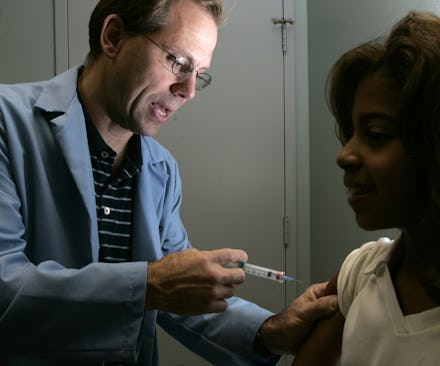Here Is Scientific Proof That the HPV Vaccine Is Working

The breakthroughs: There were two great pieces of news this week in the important battle against human papillomavirus (HPV). First, a new study in Denmark has shown that younger women who have been vaccinated have significantly fewer lesions that rise to cervical cancer. It's the first nationwide study of its kind, assessing the effectiveness of the HPV vaccine. Meanwhile, exciting research in Kenya demonstrates that a commonly used drug for HIV infections also kills off HPV.
Vaccines are effective: The published study in Denmark was conducted by doctors at the Copenhagen University Hospital. The research examined the HPV vaccination records of all women born in the period 1989-1999 using national registries. The fantastic health infrastructure in the country allowed vaccination status to be crosschecked with cases of cervical lesions using the linked national Pathology Data Bank.
"Our study reveals a reduction of between 40% and 80% of cervical precursor lesions in vaccinated women compared to non-vaccinated women," said Professor Susanne Krüger Kjær, M.D., one of the lead researchers.
Denmark was one of the earliest nations to implement the HPV vaccine nationwide, so this study is significant because it is the most comprehensive performed so far. Although progression from HPV infection to the development of cervical cancer can take decades, the reduced rate of cervical lesions due to vaccination is expected to correlate closely to reduced incidences of cancer. The remarkable success seen across the country after only a few years of the vaccine's introduction is extremely encouraging to other nations looking to follow suit with wide public vaccination programs.
Image: How vaccine induced antibodies prevent HPV infection (Credit: Nature)
A moonlighting drug: There is also encouraging news on the treatment front. Research at the Kenyatta National Hospital in Nairobi has shown that women diagnosed with high-risk strains of HPV demonstrate remission after treatment with antiviral HIV drug, Lopinavir. The women in the study took one capsule of the antiviral drug twice a day for two weeks. Within one month of the treatment, effects of the drug could be seen, and after three months, 91% of patients showed clear regression of cervical lesions with no adverse reactions.
Dr. Lynne Hampson, one of the researchers, said: "Current HPV Vaccines are prophylactics aimed at preventing the disease rather than curing or treating symptoms. Other than surgery, as yet there is no effective treatment for either HPV infection or the pre-cancerous lesion it causes which is why these results are so exciting."
HPV-related cervical cancer is one of the most common cancers in women and is responsible for 290,000 deaths per year around the world. Although the drug is a complement rather than replacement for effective vaccines, the treatment is much cheaper and therefore could be of great use in developing countries where there are fewer resources for public health.
Science works: These results point to an extremely encouraging future, and there may even be better news ahead with Merck currently testing a new HPV vaccine called V503 that’s even more effective, as it can protect against nine strains of the virus.
But scientific progress accounts for nothing if there is no public trust in evidence. While both HPV vaccines developed so far, Gardasil and Cervarix, are available in the United States, in some states fewer than 25% of adolescent girls have received the required doses. Worryingly, fewer than 35% of mothers approve of getting their daughters vaccinated, and support for vaccination is actually falling.
Image: The President's Cancer Panel Annual Report
Much public opposition stems from a general distrust of vaccines, with many affected by fraudulent studies such as the one conducted by Andrew Wakefield linking the MMR vaccine to autism. Some parents worry that the HPV vaccine sanctions teen sex despite evidence that there is no difference in the sexual activity of vaccinated girls. Hopefully studies like the one in Denmark will help to turn the tide of public opinion and encourage greater political leadership as has been seen in Australia where there is a mandatory HPV vaccine program, and in Texas where Governor Rick Perry signed a 2007 executive order requiring vaccination for 12-year-old girls.
We constantly talk about the importance of supporting the fight against cancer. We now have some proven and effective tools to combat a form of cancer for coming generations. It's about time we all publicly supported the science and used them.